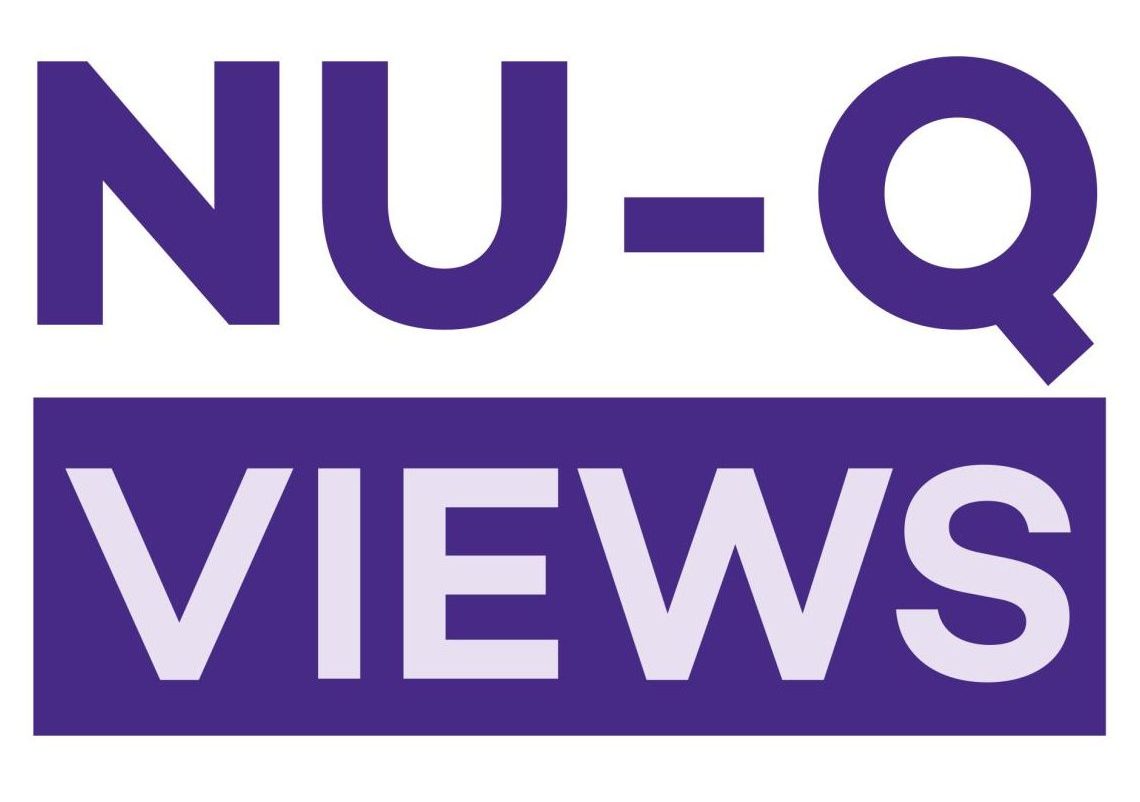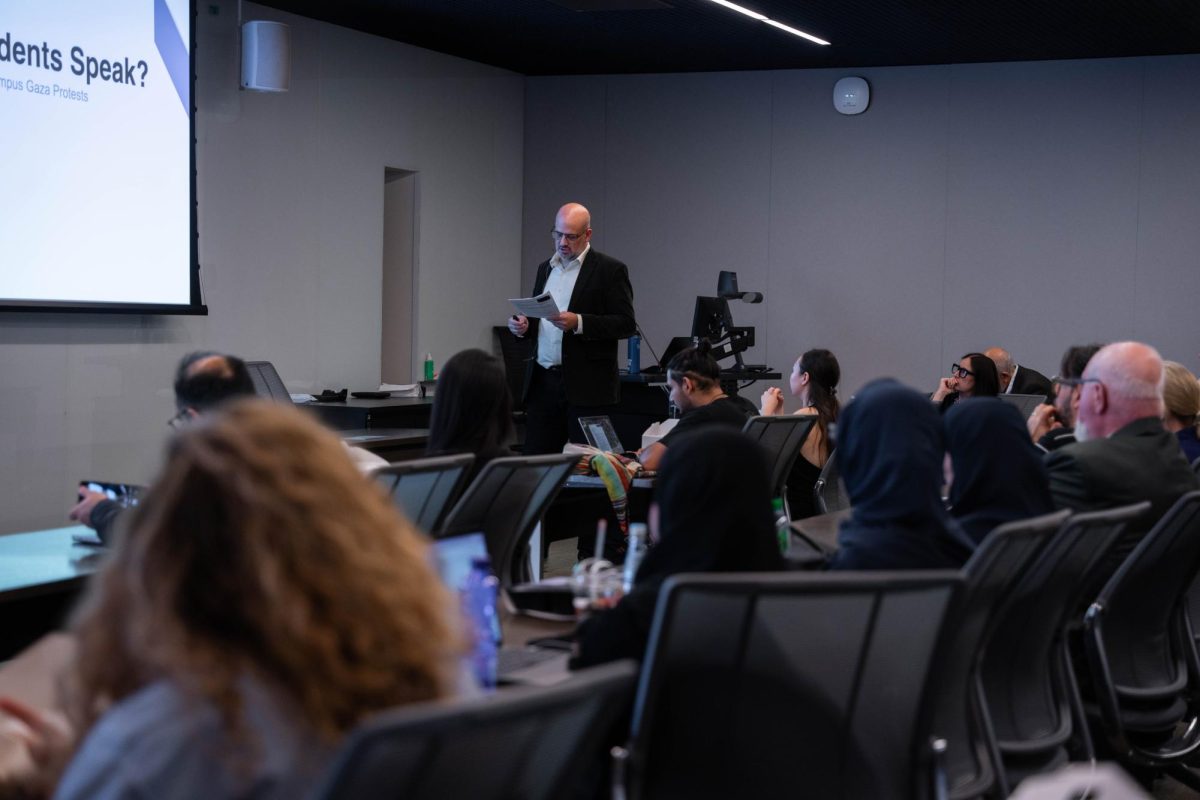Student activism in Qatar takes on distinct forms, influenced by the country’s cultural and political landscape. Unlike the high-profile protests commonly seen abroad, Qatari students tend to champion causes like the Boycott, Divestment, and Sanctions (BDS) movement through a blend of academic dialogue, collaborative efforts, and social media. This approach highlights a different model of activism, one that reflects the subtleties of Qatar’s political environment, where direct confrontation may be less feasible than in more politically liberal societies.
A Hiwar Scholars Seminar at Northwestern University in Qatar (NU-Q) brought these dynamics into sharper focus. Visiting Associate Professor William Lafi Youmans’s research Can the Students Speak? US News Coverage of the Gaza Protests dissected how U.S. media often negatively frames student activism on American campuses, diminishing the significance of social movements. He specifically examined pro-Palestinian encampments, noting that as public trust in traditional news outlets declines, activists are increasingly turning to social media to circumvent mainstream media and amplify their voices.
While Youmans focused on the portrayal of student protests in the U.S., the event sparked a critical reflection on what student activism looks like in Qatar and how it operates within its own unique constraints and opportunities. While student activism in Qatar may not take the form of large-scale protests, it still manages to make an impact, leveraging academic platforms and digital spaces to foster solidarity and advance social causes. In a region where open protest is less common, students in Qatar have found alternative ways to express their support for movements like BDS in solidarity with Palestine. Rather than public demonstrations, activism in Qatar often manifests through organized events, social media campaigns, and academic discourse. In this context, it represents a nuanced blend of subtle yet strategic actions that adapt to the country’s socio-political realities.
Hamad Abu Hassan, a senior majoring in Communications and president of Northwestern University in Qatar’s Students for Justice in Palestine (SJP), highlights the unique position of student activism in the country.
“We are fortunate that [the Qatari] government has done whatever it can to support the Palestinian people, so there isn’t a strong momentum or incentive to protest or mobilize,” Abu Hassan said. “We try our best to support the Palestinian cause, but we are lucky to be in a place where that’s the norm, and boycotts are personal choices made by our peers,” he added.
Even in the absence of large-scale protests, Abu Hassan emphasized the role that students and clubs like Students for Justice in Palestine (SJP) play in keeping the conversation about Palestine alive. “I don’t think any student club in Qatar can make a difference on its own. Neither can any in the U.S., really. I see it more as a domino effect. We all play a small part in a much bigger movement, contributing to the cause in any way we can,” he explained.
Iman El Moctar, a journalism junior at Northwestern University in Qatar, echoed this sentiment, pointing to noticeable changes on campus as part of the domino effect. “Even Coffee Time experienced a change,” El Moctar said. “They used to serve Coca-Cola, but now they’re offering Kinza cans instead. These replacement products are definitely gaining popularity.”
Although support for the BDS movement remains visible, active participation has declined. “There’s a really noticeable drop in people actively boycotting now that it has been a year. We don’t see as many boycotts or people adhering to BDS guidelines the way they were at the start,” El Moctar said. “I think that’s mainly because, over time, people have become more complacent. They don’t feel the same urgency we all felt in the beginning, when demonstrations were everywhere, and our feeds were full of these horrifying images. Now, it seems like everyone is just used to it.”
Despite the decline in active participation in the BDS movement, collaboration among student organizations across Qatar remains crucial for sustaining activism. “We are open to communicating with any other clubs and organizations. Just recently, I’ve been in contact with members of the Palestinian clubs at Georgetown University in Qatar (GU-Q) and Carnegie Mellon University in Qatar (CMU-Q), discussing how we can promote each other’s events and support each other during Solidarity Week,” Abu Hassan said.
Collaboration among student organizations is crucial for sustaining activism, particularly regarding discussions on Palestine at NU-Q. El Moctar emphasized the significance of the university’s diverse student body. “We have an extremely diverse student body from all backgrounds,” she said. “You have people from all parts of the world, giving us a unique opportunity to reach nearly every demographic in terms of ethnicity and religion. When discussing Palestine here at NU-Q, the variety of perspectives is striking. If you gather just a small sample of students, you’d find voices from five continents.”
El Moctar urged her peers to leverage this diversity. “That’s something extremely unique that we should take advantage of while we’re at NU-Q. It’s hard to find a place as diverse as this.” She noted that such diversity can lead to tangible impacts in activism, saying “The way we can make a difference is by reaching multiple diverse groups.”
In the same vein, Abu Hassan highlighted the power of small actions in driving meaningful change. “Every like or comment made on social media to advance the Palestinian narrative or every conversation with our peers makes a difference as we slowly transform into a world that sees Israel for what it truly is: a genocidal, colonial entity. No action is too small, for many small actions together make a huge difference,” Abu Hassan said.







